Filter by
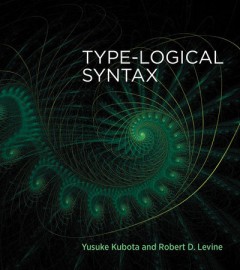
Type-logical syntax
"In this book, Yusuke Kubota and Robert Levine propose a type-logical version of categorial grammar as a viable alternative model of natural language syntax and semantics. They show that this novel logic-based framework is applicable to a range of phenomena--especially in the domains of coordination and ellipsis--that have proven problematic for traditional approaches."--OCLC-licensed vendor bi…
- Edition
- -
- ISBN/ISSN
- 0262360802
- Collation
- 1 online resource.
- Series Title
- -
- Call Number
- -
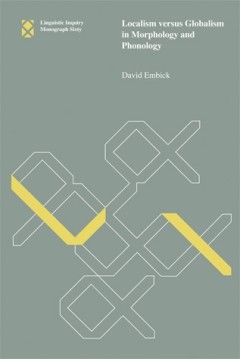
Localism versus globalism in morphology and phonology
David Embick offers a detailed examination of morphology and phonology from a phase-cyclic point of view and the only recent detailed treatment of allomorphy, a phenomenon that is central to understanding how the grammar of human language works.OCLC-licensed vendor bibliographic record.
- Edition
- -
- ISBN/ISSN
- 9780262289344
- Collation
- 1 online resource (xii, 218 pages) :illustrations.
- Series Title
- -
- Call Number
- -
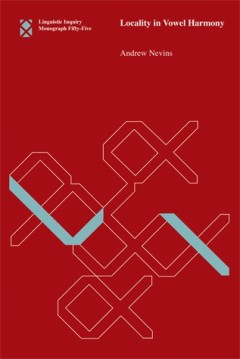
Locality in vowel harmony / Locality in Vowel Harmony
This work offers phonologists new evidence that viewing vowel harmony through the lens of relativized minimality has the potential to unify different levels of linguistic representation and different domains of empirical inquiry in a unified framework.
- Edition
- -
- ISBN/ISSN
- -
- Collation
- 1 online resource (xii, 244 pages) :
- Series Title
- -
- Call Number
- -
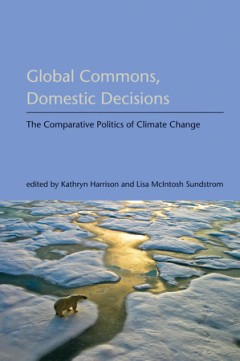
Global commons, Domestic decisions :the comparative politics of climate change
Climate change represents a “tragedy of the commons” on a global scale, requiring the cooperation of nations that do not necessarily put the Earth's well-being above their own national interests. And yet international efforts to address global warming have met with some success; the Kyoto Protocol, in which industrialized countries committed to reducing their collective emissions, took effe…
- Edition
- -
- ISBN/ISSN
- 9780262289481
- Collation
- 1 online resource (xi, 312 pages) :illustrations.
- Series Title
- -
- Call Number
- -
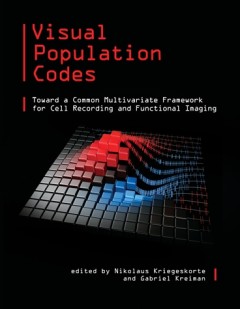
Visual population codes: Toward a common multivariate framework for cell reco…
Vision is a massively parallel computational process, in which the retinal image is transformed over a sequence of stages so as to emphasize behaviorally relevant information (such as object category and identity) and deemphasize other information (such as viewpoint and lighting). The processes behind vision operate by concurrent computation and message passing among neurons within a visual are…
- Edition
- -
- ISBN/ISSN
- 9780262303576
- Collation
- 1 online resource.
- Series Title
- -
- Call Number
- -
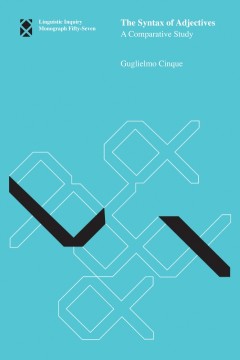
The syntax of adjectives :a comparative study
In The Syntax of Adjectives, Guglielmo Cinque offers cross-linguistic evidence that adjectives have two sources. Arguing against the standard view, and reconsidering his own earlier analysis, Cinque proposes that adjectives enter the nominal phase either as “adverbial” modifiers to the noun or as predicates of reduced relative clauses. Some of his evidence comes from a systematic comparison…
- Edition
- -
- ISBN/ISSN
- 9780262289306
- Collation
- 1 online resource (xv, 202 pages) :illustrations.
- Series Title
- -
- Call Number
- -
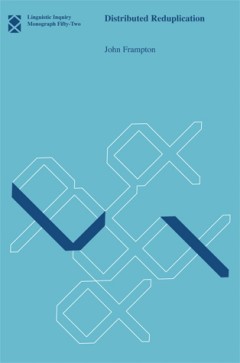
Distributed reduplication
A convincing account of reduplicative phenomena has been a longstanding problem for rule-based theories of morphophonology. Many scholars believe that derivational phonology is incapable in principle of analyzing reduplication. In Distributed Reduplication, John Frampton demonstrates the adequacy of rule-based theories by providing a general account within that framework and illustrating his pr…
- Edition
- -
- ISBN/ISSN
- 9780262258777
- Collation
- 1 online resource (xiv, 228 pages) :illustrations.
- Series Title
- -
- Call Number
- -
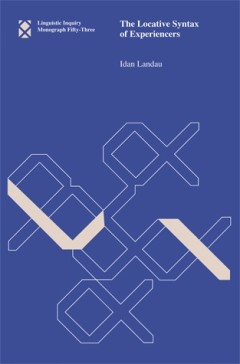
The locative syntax of experiencers
Experiencers—grammatical participants that undergo a certain psychological change or are in such a state—are grammatically special. As objects (John scared Mary; loud music annoys me), experiencers display two peculiar clusters of nonobject properties across different languages: their syntax is often typical of oblique arguments and their semantic scope is typical of subjects. In The Locati…
- Edition
- -
- ISBN/ISSN
- 9780262259026
- Collation
- 1 online resource (vi, 165 pages) :illustrations.
- Series Title
- -
- Call Number
- -

Why America Is Not a New Rome
An investigation of the America-Rome analogy that goes deeper than the facile comparisons made on talk shows and in glossy magazine articles.America's post-Cold War strategic dominance and its pre-recession affluence inspired pundits to make celebratory comparisons to ancient Rome at its most powerful. Now, with America no longer perceived as invulnerable, engaged in protracted fighting in Iraq…
- Edition
- -
- ISBN/ISSN
- 9780262283885
- Collation
- -
- Series Title
- -
- Call Number
- -

Indefinite objects :scrambling, choice functions, and differential marking
A novel view of the syntax-semantics interface that analyzes the behavior of indefinite objects. In Indefinite Objects, Luis Lopez presents a novel approach to the syntax-semantics interface using indefinite noun phrases as a database. Traditional approaches map structural configurations to semantic interpretations directly; Lopez links configuration to a mode of semantic composition, with the …
- Edition
- -
- ISBN/ISSN
- 0262305631
- Collation
- 1 online resource (xi, 172 pages) :illustrations.
- Series Title
- -
- Call Number
- -
 Computer Science, Information & General Works
Computer Science, Information & General Works  Philosophy & Psychology
Philosophy & Psychology  Religion
Religion  Social Sciences
Social Sciences  Language
Language  Pure Science
Pure Science  Applied Sciences
Applied Sciences  Art & Recreation
Art & Recreation  Literature
Literature  History & Geography
History & Geography